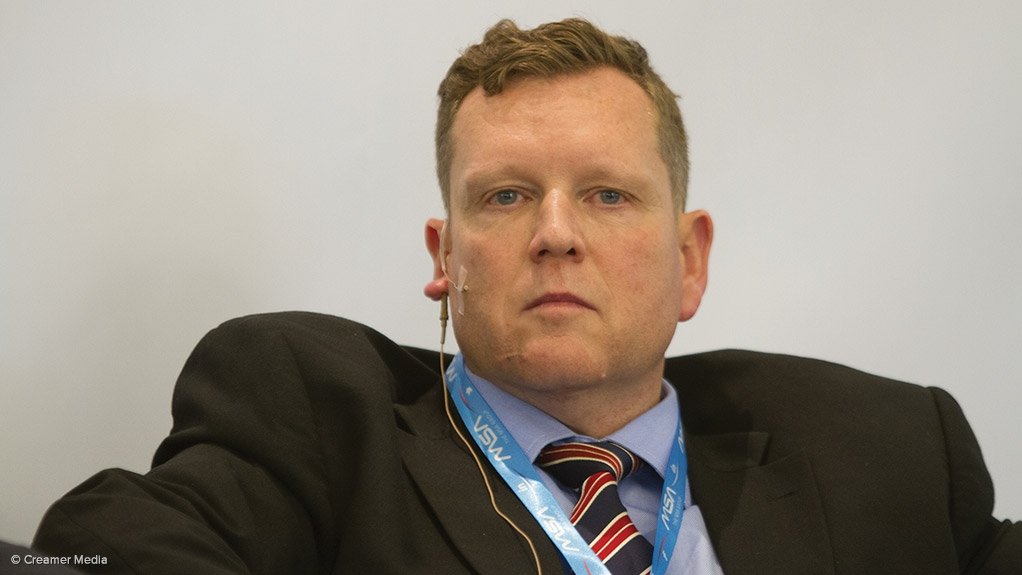Platinum producers hard-pressed to meet union demands, says legal expert



INDUSTRY ANXIETY The demands of the National Union of Mineworkers and Association of Mineworkers and Construction Union raise ‘serious concerns’ for the whole platinum industry
Photo by Reuters
WARREN BEECH Most platinum miners have survived the past two years with some even returning to profit-making owing to ‘painful’ restructuring programmes
Photo by Duane Daws
The National Union of Mineworkers (NUM) will be demanding a wage increase of 20% a year for the next two years and the Association of Mineworkers and Construction Union (AMCU) an entry-level salary of R12 500 a month in the upcoming talks with platinum producers.
AMCU is also seeking increases of about 15% for higher work categories and overall improvements in allowances and benefits.
International law firm Hogan Lovells partner and Africa mining head Warren Beech believes that the country’s major platinum producers – Anglo American Platinum (Amplats), Impala Platinum (Implats) and Lonmin – will find it difficult to meet these demands, given the current position that the mining industry finds itself in, which raises “serious concerns” for the whole industry.
He points out that AMCU’s demand of at least R12 500 a month translates into an increase of between 20% and 50%, depending on the relevant mining company, for the industry’s lowest-paid workers.
“If AMCU is not willing to accept a compromise on [this], I believe that companies are going to be extremely hard-pressed to agree to this minimum wage.”
Beech says it is likely that this will result in a difficult negotiating period between AMCU and the platinum miners and could “unfortunately” result in another protracted strike, similar to the one that occurred in 2014, “which the industry simply cannot afford”.
The previous platinum-sector wage negotiations resulted in a five-month-long strike that cost the sector about R24-billion. The stayaway ended when a three-year deal was struck, in terms of which employees earning a monthly basic salary below R12 500 received an increase of R1 000 a month for the first two years. At Lonmin, the same increase applied to the third year; however, Amplats and Implats agreed to a R950 a month increase for the third year.
Further, employees earning R12 500 a month or more or whose basic wage rate reached that amount during the course of the three-year agreement received an 8% increase for the first two years and 7.5% thereafter.
AMCU noted recently that all platinum companies had retrenched a significant number of workers over the past two years and argued that they were therefore “well positioned” to offer better wage deals than they had previously. The union also refuted claims that higher wages resulted in increased unemployment.
However, Beech contends that most platinum miners have survived the past two years, with some even returning to profit-making, owing to “painful” restructuring programmes implemented during the period.
This “pain” included a substantial reduction in the number of contractors and other service providers, as well as mining companies having to retrench thousands of workers. He says these cost-cutting and containment programmes are crucial in ensuring the viability of many platinum operations.
“The current improvement in platinum prices may not be sustainable, as global demand for platinum, particularly from China, remains subdued. Moreover, the price is about 30% down from where it was two years back,” Beech highlights, adding that platinum miners are not in a financial position to accede to the demands of either union.
Mining companies will likely start negotiations by offering increases below the inflation rate (6%), but will aim to settle at either close to or 1% to 2% above the inflation rate, he says.
Further, Beech does not believe that the platinum miners can afford a protracted strike of one month or longer, as any action of longer than a week will have a “material impact” on mines and likely undo all the gains that the industry has achieved over the past six months.
To avoid a strike, unions need to undertake a “strong, realistic analysis” to understand why some companies are doing better currently than they were in the past 18 months, he says.
“It is essential that all stakeholders involved focus on medium- to long-term strategies aimed at sustaining the gains that have been made, creating an environment where jobs can be provided and meaningful contributions can be made to communities around the mines,” Beech concludes.
Comments
Press Office
Announcements
What's On
Subscribe to improve your user experience...
Option 1 (equivalent of R125 a month):
Receive a weekly copy of Creamer Media's Engineering News & Mining Weekly magazine
(print copy for those in South Africa and e-magazine for those outside of South Africa)
Receive daily email newsletters
Access to full search results
Access archive of magazine back copies
Access to Projects in Progress
Access to ONE Research Report of your choice in PDF format
Option 2 (equivalent of R375 a month):
All benefits from Option 1
PLUS
Access to Creamer Media's Research Channel Africa for ALL Research Reports, in PDF format, on various industrial and mining sectors
including Electricity; Water; Energy Transition; Hydrogen; Roads, Rail and Ports; Coal; Gold; Platinum; Battery Metals; etc.
Already a subscriber?
Forgotten your password?
Receive weekly copy of Creamer Media's Engineering News & Mining Weekly magazine (print copy for those in South Africa and e-magazine for those outside of South Africa)
➕
Recieve daily email newsletters
➕
Access to full search results
➕
Access archive of magazine back copies
➕
Access to Projects in Progress
➕
Access to ONE Research Report of your choice in PDF format
RESEARCH CHANNEL AFRICA
R4500 (equivalent of R375 a month)
SUBSCRIBEAll benefits from Option 1
➕
Access to Creamer Media's Research Channel Africa for ALL Research Reports on various industrial and mining sectors, in PDF format, including on:
Electricity
➕
Water
➕
Energy Transition
➕
Hydrogen
➕
Roads, Rail and Ports
➕
Coal
➕
Gold
➕
Platinum
➕
Battery Metals
➕
etc.
Receive all benefits from Option 1 or Option 2 delivered to numerous people at your company
➕
Multiple User names and Passwords for simultaneous log-ins
➕
Intranet integration access to all in your organisation




















